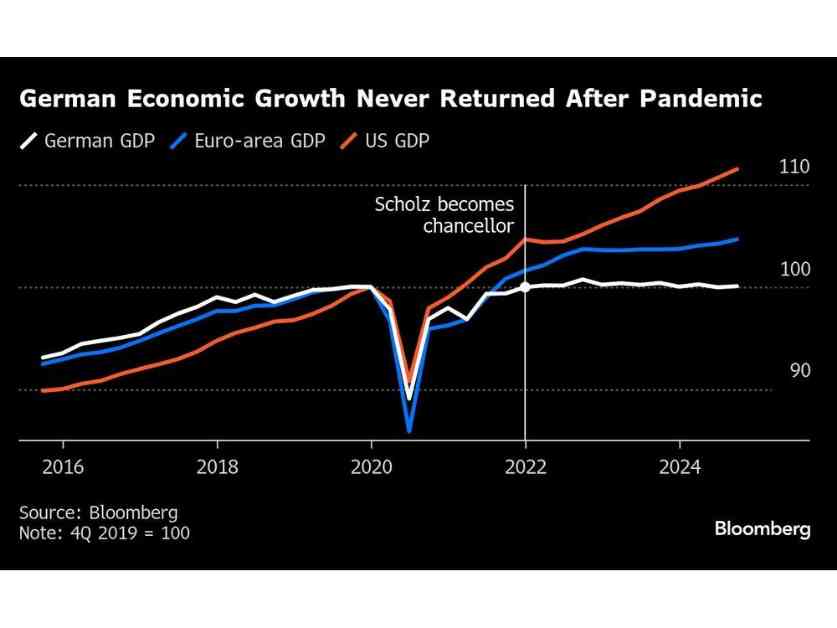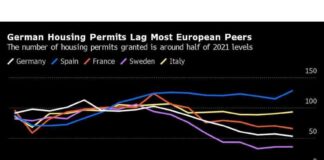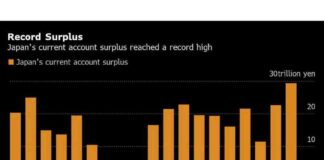Olaf Scholz, the German Chancellor, is facing the impending doom of the worst election defeat in the country’s history. The main culprit behind this impending political catastrophe is Scholz’s lackluster economic performance during his term. If the polls are to be believed, showing a significant drop from his 2021 victory, the Social Democrats under Scholz are set to experience a defeat of unprecedented proportions since the establishment of the Federal Republic in 1949. With a projected vote share of approximately 15%, Scholz is on track to record the lowest result for any incumbent leader.
The economic woes plaguing Scholz’s administration have come to define the upcoming election, echoing a similar sentiment seen during Gerhard Schroeder’s narrow defeat in 2005. The echoes of Germany being labeled as the “sick man of Europe” resonate once again, as the country struggles to rebound from the pandemic under Scholz’s leadership. While other countries swiftly recovered, Germany’s failure to do so has cast a shadow over Scholz’s three-year tenure. The next government will face the Herculean task of reviving Europe’s largest economy after two years of contraction.
Challenges in Manufacturing and Trade
The crux of Germany’s economic malaise lies in its manufacturing sector, which holds a substantial share of the country’s output compared to its peers. Although the pandemic initially favored Germany due to a shift in consumer demand towards goods, the subsequent supply-chain disruptions, escalating energy and labor costs, and high-interest rates have posed significant challenges. The competitive pressure from Chinese electric vehicle manufacturers has further exacerbated the situation, leading to job cuts at Volkswagen AG, the nation’s largest automotive producer.
The decline in German industrial production contrasts with the global trend, indicating a loss of competitiveness among German companies. The country’s substantial trade surplus with the US exposes it to the risk of additional tariffs if President Donald Trump follows through on his threats against the European Union. The potential imposition of levies on crucial exports like cars and industrial machinery could deal a severe blow to Germany’s economy.
Energy Transition and Fiscal Pressures
The energy transition and government finances have emerged as pivotal points of debate in the run-up to the election. Germany’s overreliance on Russian energy imports has left it vulnerable to disruptions, as witnessed during the war in Ukraine. The government’s efforts to diversify energy sources and promote renewable energy have yielded some success, with notable advancements in solar and wind energy. However, grid expansion challenges and the lack of backup capacity post the nuclear phase-out pose significant hurdles in the transition to green energy.
Pressure to increase public spending has intensified, driven by the urgent need to address infrastructure deficiencies and modernize key sectors like education and transportation. The German Council of Economic Experts has criticized the government for its inadequate allocation of funds to future-oriented areas, highlighting the need for substantial investments in various sectors. The estimated costs for these initiatives are staggering, calling for significant financial commitments over the next decade.
Despite the economic challenges looming large, Germany’s labor market has shown resilience amid the turbulent economic landscape. Staff shortages in sectors like hospitality and healthcare point to a mismatch in skills, while demographic shifts pose future labor market challenges. The upcoming government holds the key to steering Germany’s economic trajectory in a positive direction, with the potential to implement structural reforms that could reignite growth and dispel fears of decline.
In the words of Bundesbank President Joachim Nagel, “Reliable, predictable actions” by the next federal government could pave the way for increased investment and expansion, signaling hope for a brighter economic future. The onus lies on the incoming leadership to drive reforms that will rejuvenate Germany’s growth prospects and instill confidence in the country’s economic stability.






















